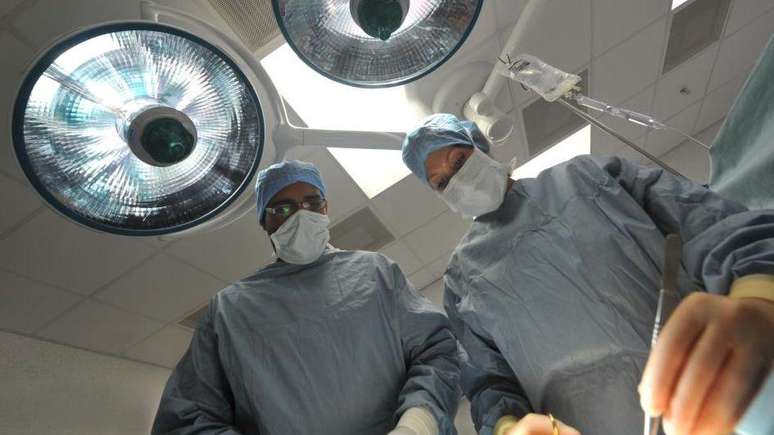Presidents of China and Russia were listened to discussing the use of transplants to prolong human life. Can they be right?
Is it possible that someone becomes immortal with the help of organ transplants?
This was an unexpected discussion theme this week, between Chinese President Xi Jinping, and his Russian colleague Vladimir Putin during the military parade in Beijing, China.
A translator, who speaks of mandarin on behalf of Putin, told Xi how the human organs can be repeatedly transplanted “so that a person becomes younger” rather than aging. And that perhaps “indefinitely” old age can avoid.
“It is expected that in this century it may be possible to live until the age of 150,” he added.
Smiles and laughter indicate that it was a little joke, but can they be on the right way?
Organ transplants certainly save lives. In the United Kingdom, over 100,000 people have been saved from transplants in the last 30 years, according to NHS, the public health service.
The continuous progress in medicine and technology mean that the transplanted organs have worked much more after surgery. Some patients had transplanted kidneys who worked for over 50 years.
The life of an organ depends on the health conditions of the donor and the patient, as well as on treatment after transplantation.
If you receive a new kidney from a living donor, for example, the expected duration can be between 20 and 25 years old. But if the organ comes from a dead donor, the expectation drops from 15 to 20 years.
The type of organ also influences. The research indicates that a liver can last about 20 years, a heart lasts 15 years and the lungs, about 10 years.
Transition to eternal life?
Putin and XI could speak of more organ transplantation, perhaps repeatedly.
But surgery is laborious and involves significant risks. Every time you face the scalpel, it is releasing the data.
Currently, people who receive a new organ must also take strong drugs against refusal for life. They are known as immunosuppressors and can cause side effects such as hypertension and increase the risk of infections.
Refusal occurs when the immune system begins to attack the transplanted organ because it recognizes it as coming from someone else. Sometimes it can also occur to take drugs.
Tailor -made organs
Scientists are working to produce organs without refusal using genetically modified pigs as donors.
They use a genetic editing tool known as CRISPR to remove some of the pork genes and add some human genes, increasing the compatibility of the organ.
Ideally, the creation of pigs especially for this purpose, according to experts, because their organs are approximately the right size for people.
Science in this field is still extremely experimental, but there have already been transplants of kidney and heart.
The two men who agreed with the procedure were the pioneers of this new medical field. They died from surgery, but contributed to the xenotrapriants advance, that is, the transplantation of cells, tissues or organs from one species to another.
Another explored path is the cultivation of new organs, using our cells of human cells, which have the ability to grow and form any type of cell or tissue found in the body.
So far, no research group has been able to produce totally functional transplants, but scientists are approaching this goal.
In December 2020, British researchers from the University of London and Francis Crick Institute reconstructed a human thymus (an essential organ of our immune system), using human stem cells and a bioengineering matrix. The organ was transplanting in rats as a test and apparently worked.
The scientists of the Great Ormond Street Hospital in London claim to have cultivated human intestinal grafts using the patient tissue stem cells. One day, these fabrics can lead to customized transplants to children with intestinal impairment.
But these progress aims to treat health problems, not to keep people alive until the age of 150.

The technological entrepreneur Bryan Johnson spends millions of millions a year, trying to reduce his biological age.
He has not tried to get new organs as far as he is known. But the plasma of the 17 -year -old son has even been infused.
Johnson suspended the infusion because he did not observe benefits, expanding the medical evaluation of organizations such as the Food and Drug Agency (FDA) of the United States.
Julian Mutz of King’s College London said that, in addition to organ transplantation, techniques such as plasma, but still in the experimental phase.
“It is not yet known whether these strategies will have a significant impact on longevity, in particular on the utmost human longevity, but it is an area of considerable scientific interest,” he explains.
The immunopathology expert Neil Mabbott of the Roslin Institute of the University of Edinburgh in the United Kingdom hypothesizes that the maximum limit of human life can be up to 125 years of age.
“The oldest living person ever recorded was a French woman, Jeanne Calment, who lived for 122 years, between 1875 and 1997,” he told the BBC.

The sick and injured organs can be replaced by transplants. But our body, as we age, becomes much less resistant or able to face physical stress factors.
“We begin to react in a less effective way to infections and our bodies become more fragile, more subject to injuries and less able to recover and repair,” explains Mabott.
“The stress, the trauma and the impact of transplant surgery, together with the continuous use of the immunosuppressive drugs necessary to avoid the refusal of the transplanted organs, would be too serious for patients with that advanced age.”
The teacher claims that instead of focusing on the increase in longevity, we should fight to maintain our health longer.
For him, “live much more, but suffering from the various soft ones who accompany the aging, entry and departure of the hospital for another fabric transplant, it does not seem an attractive way to pass the pension”.
Source: Terra
Ben Stock is a lifestyle journalist and author at Gossipify. He writes about topics such as health, wellness, travel, food and home decor. He provides practical advice and inspiration to improve well-being, keeps readers up to date with latest lifestyle news and trends, known for his engaging writing style, in-depth analysis and unique perspectives.








